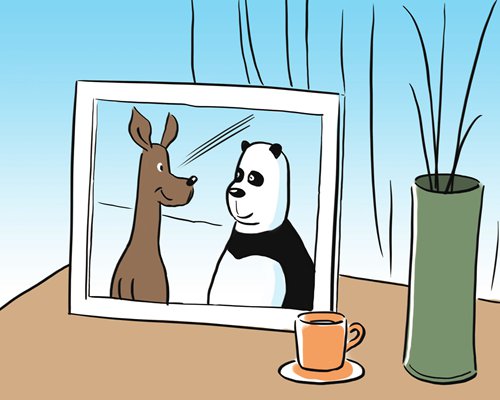
Illustration: GT
The tone from the latest Australian Foreign Policy White Paper was interpreted by some of my Chinese friends as being hawkish, unfriendly and irresponsible. I was a bit saddened by their remarks, since not every Australian believes that we need to pick one friend over another. For many years now, our willingness to work with our partners has been coupled with "uncertainty." This is something that we feel strongly about when it comes to China.
To put it bluntly, we are unsure how to effectively engage with our Asian neighbors. We are not sure how the region will play out in the future and above all, how we can continue to navigate and deal with our many alliances and friendships around the world. If there is one thing that I agree with, it's the fact that we are indeed living in a changing and multi-polar world. What I don't agree with is that there should be a "US-anchored rules and order" and that a "US retreat will make the entire Asia-Pacific region more unpredictable and dangerous." I hardly call what has happened in the Middle East as something peaceful.
Why must such "US-led" words even appear in the Australian White Paper? And while I'm at it, why are there US Marines running around in Darwin? Ok, some will say this is part of the Australia-US alliance, but why must we use this as an argument or justification to counteract a rising China?
As one of our largest trading partners, China is not a threat. Like us, China is making changes. As a traditionally inner-looking nation, she is now engaging more with the world and is gaining more chances for her voice to be heard. China, like everyone else, wants recognition as a player in the international arena. There is nothing wrong with that.
Thus, this shift makes Australia a bit unsure and nervous, which is quite a normal reaction considering the fact that we don't really know them that well. Although there has been an increase in students learning Chinese, gaining that deeper understanding of the Chinese mindset is more about being fluent in the language. It's just a tool.
We need to engage with them at a local level, be multilingual and make it clear that they also understand our position without it leading to miscommunication. Yes, we have good access to the Chinese leadership, but access is just like an open door; how well we use it requires another set of skills.
If we can communicate with the US, the UK and other European countries, we can surely achieve a comfortable level of security and stability through dialogue with someone who we've traded with for a long time. Sure we have different interests, values and political and legal systems, so there is bound to be friction, but from one sovereign country to another, this is normal. Working with someone who is fundamentally different does not mean that they are our enemy, nor do we need to side with one to counteract the other.
The only way for Australia and indeed any other country to improve is to maximize benefits from our partners and gain international influences through engagements. This will often force us to venture out of our comfort zones. Therefore, being a tad nervous is normal. Instilling fear and envisioning a big scary enemy is not the right way to tackle diplomacy. Having to pick one over the other makes us look weak and unfortunately dependent. My Australia is far from that.
We do not need to choose one friend over the other. This mindset is out of touch with reality. It is about running our own show through dialogue and true diplomacy, and not allowing fear to ruin our rational thinking. The only thing that we need to contain is our fears since if we don't, how can we work toward seeking long-term interests and stability? It certainly is not about envisioning an enemy and being one-sided.
Whether we like it or not, we must work together, especially since this world is disruptive, unpredictable and challenging. It is more than possible for Australia to preserve her own national interest while engaging with China, the US and certainly the world. We can safeguard one's sovereignty and accept someone else as a global player at the same time. We do not need to choose between anyone.


